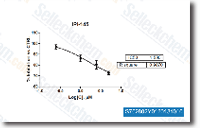A number of retrospective situation control research in Korea have supported chemopreventive results of gin seng that appears to exert a broad spectrum of anti tumor pursuits in people. Ginseng is often a deciduous perennial plant belonging to the Araliaceae Ivy family which has been utilized for centuries in China and Korea as an anti inflammatory agent. Ginseng extracts con tain ginsenosides because the main biologically lively consti tuents, which are glycosides with a dammarane skeleton. Several in vitro research have demonstrated anti tumor results of ginseng alone or in combination with anti cancer agents. Antioxidant, anti prolifera tive and anti inflammatory results of ginseng have already been recognized that may mediate the anti tumor effects of this herb. Also, ginseng metabolites are actually proven to inhibit EGFR induced epithelial cell growth.
Furthermore, a recent study inside a model of colitis associated colon cancer showed that ginseng diminished levels of phospho energetic EGFR and phospho active ErbB2 likewise as ERK, a down stream effector of EGFR, indicating ginseng could suppress EGFR signals in colonic tumorigenesis. Given the requirement pan VEGFR inhibitor for EGFR in tumor promotion by Western diet plan, in the cur lease study we investigated the skill of ginseng extract to inhibit colonic tumorigenesis below situations of Western dietary stress. Tumors had been induced with azox ymethane followed by dextran sulfate sodium. Azoxymethane is actually a pro carcinogen which is meta bolized while in the liver and additional metabolized within the colon to an active alkylating agent, presumably a methyl car or truck bonium ion.
This methyl donor leads to guanine methylations and finally G to A transitions. Proto oncogenes targeted by AOM involve activating mutations in b catenin and K Ras. DSS is really a polysul fated polymer that arrests colonic crypt cell re genera tion resulting in acute mucosal ulceration and clinical colitis that enhances in the know “ tumorigenesis. Numerous scientific studies have identified many bacterial metabolites of ginseng with biological actions. These consist of 20 O b 20 proto panaxadiol or compound K that induces apoptosis in colon cancer cells. Since the microbiome is vital for compound K generation, we examined the effects of dietary ginseng on microbial diversity and results of broad spectrum antibiotics on compound K bioavailability. Quite a few ginsenosides are shown to inhibit cancer growth, which includes colon cancer cells in tumor xenograft versions.
To right test compound K anti tumor activity in colon cancer, we also examined the effects of this microbial metabolite of ginseng on colon cancer cell development in the tumor xeno graft model. Taken  together, on this study we show for that very first time that ginseng can inhibit irritation asso ciated colonic tumorigenesis in mice fed a tumor professional moting Western diet regime.
together, on this study we show for that very first time that ginseng can inhibit irritation asso ciated colonic tumorigenesis in mice fed a tumor professional moting Western diet regime.
PDGF Signal
PDGF signal transduction inhibition ameliorates experimental
